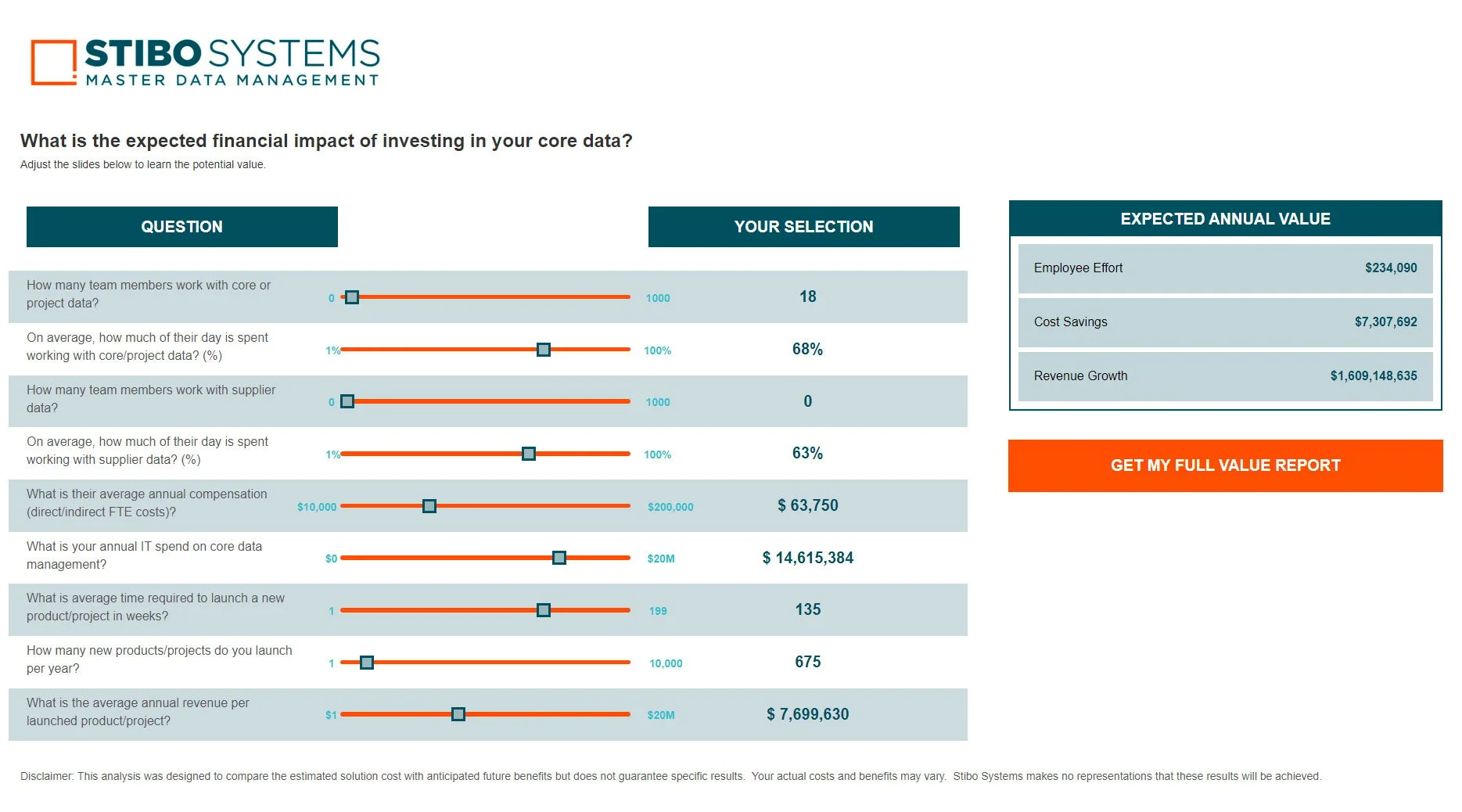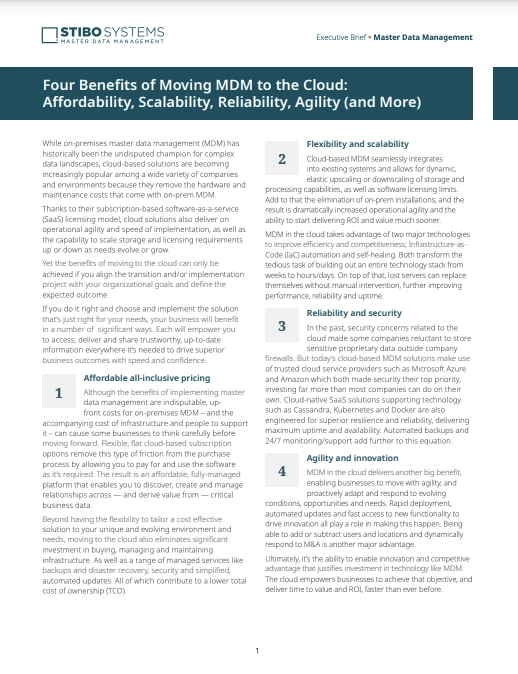In today's rapidly changing business environment, organizations are collecting and generating vast amounts of data from multiple sources. This data can be of different formats, structures and quality, making it challenging to manage effectively. Cloud master data management is a solution that helps organizations tackle these data management challenges by providing a centralized platform for managing, integrating and maintaining their data assets.
In this blog post, we will explore what cloud master data management is, how it works and why it is essential for businesses looking to improve their data management capabilities. We will also discuss some of the key benefits of cloud master data management and how it can help organizations improve their overall business performance.

What is cloud master data management?
Cloud master data management (MDM) is a modern approach to managing and maintaining an organization's data assets. It involves using cloud-based solutions to store, integrate, and manage data from different sources across the organization. Cloud master data management is designed to provide a centralized platform for managing data, enabling organizations to achieve greater consistency, accuracy and completeness of their data.
What are the key features and functionalities of cloud master data management?
Cloud master data management solutions offer a range of key features and functionalities, which can include:
-
Data integration: Cloud MDM solutions can integrate data from different sources, including internal and external data sources, into a centralized platform.
-
Data cleansing: Cloud MDM solutions can identify and correct errors or inconsistencies in data, ensuring data accuracy and completeness.
-
Data governance: Cloud MDM solutions provide a framework for managing data and ensuring compliance with regulations and policies.
-
Data quality management: Cloud MDM solutions provide tools and workflows for managing data quality, ensuring that data is consistent, accurate and up-to-date.
-
Data analytics: Cloud MDM solutions can provide insights and analytics on the data, allowing organizations to make informed decisions based on data-driven insights.
-
Workflow management: Cloud MDM solutions provide tools and workflows for managing the process of data management, ensuring that tasks are completed efficiently and effectively.
-
Collaboration and integration: Cloud MDM solutions enable collaboration and integration across departments, ensuring that data is shared and used effectively across the organization.
-
Security: Cloud MDM solutions offer advanced security features, such as data encryption, firewalls and user authentication, to protect sensitive data from cyber threats.
Overall, cloud master data management solutions provide a range of key features and functionalities, enabling organizations to manage and maintain their data assets effectively and efficiently.
Get the executive brief
Four Benefits of Moving MDM to the Cloud
Affordability, Scalability, Reliability, Agility (and More)
How does cloud master data management differ from traditional on-premise master data management?
Cloud master data management differs from traditional on-premise master data management solutions in several ways.
Firstly, cloud-based master data management solutions are accessed through the internet, which means that users can access their data from anywhere with an internet connection. In contrast, on-premise master data management solutions require users to access data from a physical location such as an office.
Secondly, cloud-based master data management solutions are typically more scalable than on-premise solutions. Cloud solutions can handle large volumes of data without the need for additional hardware, whereas on-premise solutions require organizations to maintain their own hardware infrastructure.
Thirdly, cloud-based master data management solutions are typically more cost-effective than on-premise solutions. Organizations using cloud-based solutions do not need to invest in hardware infrastructure or employ IT staff to maintain it, resulting in lower overall costs.
Fourthly, cloud-based master data management solutions offer greater flexibility than on-premise solutions. Cloud solutions can be customized and configured to meet the specific needs of an organization and can be easily scaled up or down as needed.
Finally, cloud-based master data management solutions provide greater collaboration and integration across departments. With a centralized platform for managing data, organizations can ensure that their data is consistent, accurate and up-to-date, and can provide access to the data across departments to improve business operations and decision-making.
What are the specific advantages of using a cloud-based master data management solution?
There are several advantages of using a cloud-based master data management solution:
-
Faster deployment: Cloud MDM solutions can be deployed faster than on-premise solutions because they do not require the installation and configuration of hardware and software on-premise. With cloud MDM solutions, organizations can start managing their data almost immediately after signing up.
-
Flexibility: Users can access data from anywhere with an internet connection, providing greater flexibility and agility in managing data.
-
Improved collaboration: Cloud MDM solutions provide a centralized platform for managing data, enabling greater collaboration and integration across departments. With a centralized platform, users can access and share data in real-time, leading to more informed decision-making and improved business operations.
-
Scalability: Cloud MDM solutions are designed to handle large volumes of data and users, making them more scalable than on-premise solutions. This means that organizations can easily add or remove users, and expand or reduce their data storage capacity as needed.
-
Cost savings: Cloud MDM solutions reduce the need for organizations to maintain their own hardware and software infrastructure, as these are provided by the cloud service provider. This reduces the costs associated with maintaining and updating hardware and software, as well as the need for IT staff to manage the infrastructure.
-
Improved security: Cloud MDM solutions offer advanced security features, such as data encryption, firewalls, and user authentication, to protect sensitive data from cyber threats. Cloud providers typically have more robust security protocols in place than most organizations, which helps to ensure the security and privacy of sensitive data.
Overall, cloud-based master data management solutions offer several advantages over on-premise solutions, including faster deployment, flexibility, improved collaboration, scalability, cost savings and improved security. These benefits make cloud-based master data management solutions an attractive option for organizations looking to manage and maintain their data assets effectively and efficiently.
Security and compliance considerations for cloud master data management
When it comes to cloud master data management, security and compliance are critical considerations. Here are some of the key security and compliance considerations for cloud master data management:
-
Data privacy: Cloud MDM solutions may store sensitive data, such as customer or financial data. As such, it is important to ensure that the data is stored securely and in compliance with data privacy regulations such as GDPR or CCPA. Cloud MDM solutions typically have built-in security features such as encryption and data masking to help protect sensitive data.
-
Access control: It is important to ensure that only authorized users have access to sensitive data. Cloud MDM solutions typically provide granular access control mechanisms, allowing administrators to set permissions at the individual user or group level. This helps to ensure that sensitive data is only accessed by those who need it.
-
Regulatory compliance: Depending on the industry or location of the organization, there may be specific regulatory requirements that must be adhered to. Cloud MDM solutions should provide compliance with relevant regulations.
-
Data residency: Some organizations may be required to store data within a specific geographic region due to regulatory or legal requirements. Cloud MDM solutions should allow organizations to choose the location where their data is stored, ensuring compliance with data residency regulations.
-
Data backup and recovery: Data backup and recovery is an essential aspect of any MDM solution. Cloud MDM solutions typically offer robust backup and recovery features, ensuring that data is protected from loss due to hardware or software failure, natural disasters or other unforeseen events.
-
Vendor security: Cloud MDM solutions rely on third-party cloud service providers. It is important to ensure that the service provider has robust security measures in place to protect against data breaches or cyber-attacks. It is also important to review the service provider's security and compliance certifications to ensure that they meet industry standards.
In summary, security and compliance considerations are critical when selecting a cloud master data management solution. It is important to ensure that the chosen solution has robust security features in place to protect sensitive data, provides compliance with relevant regulations and has a secure and reliable cloud service provider. By carefully considering these factors, organizations can ensure that their data is protected while reaping the benefits of cloud-based master data management solutions.
Are you considering investing in master data management?
Calculate Now
Estimate the ROI of your master data management initiative.
How to choose the right cloud master data management solution?
Choosing the right cloud master data management solution is an important decision that can impact the success of your organization's data management initiatives. Here are some factors to consider when selecting a cloud-based master data management solution:
-
Scalability: Ensure that the cloud MDM solution can scale to meet the growing needs of your organization. This includes the ability to handle increasing data volumes, support for new data types and the ability to integrate with other systems as needed.
-
Security: Data security should be a top priority when selecting a cloud MDM solution. Make sure the solution provides robust security features such as data encryption, access control and data backup and recovery.
-
Compliance: Depending on your industry and geographic location, there may be specific regulations and compliance requirements that you need to consider when selecting a cloud MDM solution. Make sure the solution complies with all relevant regulations and provides features to help you maintain compliance.
-
Flexibility: A cloud MDM solution should be flexible enough to meet the unique needs of your organization. Make sure the solution allows you to configure workflows and processes to match your specific requirements.
-
Integration: Integration with other systems is critical to the success of a cloud MDM solution. Ensure that the solution provides robust integration capabilities and supports the data formats and protocols used by other systems in your organization.
-
Ease of use: A cloud MDM solution should be easy to use and accessible to all stakeholders in your organization. Make sure the solution provides a user-friendly interface and supports collaboration and communication across teams.
-
Vendor reputation and support: Choose a reputable vendor with a proven track record of delivering high-quality MDM solutions. Make sure the vendor provides comprehensive support, including training, maintenance and ongoing updates.
By considering these factors when selecting a cloud master data management solution, you can ensure that the solution meets your organization's needs and provides the necessary features and functionality to manage your data effectively.
Best practices for implementing cloud master data management solutions
Implementing a cloud-based master data management solution can be a complex undertaking. Here are some best practices to help ensure a successful implementation:
1. Define clear objectives and requirements
Before selecting a cloud master data management solution, it is important to define clear objectives and requirements for the project. This should include a detailed analysis of the data management needs of the organization as well as an assessment of the potential benefits and risks of cloud master data management.
2. Choose the right cloud master data management solution
Select a cloud master data management solution that meets the specific needs and requirements of the organization. It is important to consider factors such as scalability, security, compliance and ease of use when selecting a solution.
3. Develop a comprehensive implementation plan
A detailed implementation plan can help ensure that the project stays on track and is completed within the expected timeline and budget. The plan should include tasks, timelines and responsibilities for each phase of the project as well as risk mitigation strategies.
4. Ensure data quality and consistency
The success of a cloud master data management solution depends on the quality and consistency of the data being managed. It is important to establish data quality standards and processes to ensure that the data is accurate, complete and consistent across all systems and applications.
5. Provide adequate training and support
Adequate training and support are critical to the success of a cloud master data management implementation. It is important to provide comprehensive training to all users of the system as well as ongoing support and maintenance to ensure that the system continues to meet the needs of the organization.
6. Monitor and measure success
Regular monitoring and measurement of key performance indicators (KPIs) can help organizations track the success of their cloud master data management implementation. This should include metrics such as data quality, user adoption and ROI.
By following these best practices, organizations can increase the likelihood of a successful cloud master data management implementation. By selecting the right solution, developing a comprehensive implementation plan, ensuring data quality and consistency, providing adequate training and support and monitoring and measuring success, organizations can realize the many benefits of cloud-based master data management.
Book a free product demo by our experts or estimate the ROI of your next demand management project »








